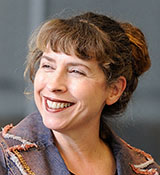What is Philosophy?
Philosophy allows you to study the human search for meaning in various cultures and societies. Find out how philosophers pose and answer the great questions of life and explore the spiritual dimensions of the human condition.
Philosophy at Augustana
Augustana's philosophy courses provide a strong basis in historical and critical methods. We are rooted in the continental tradition, but with a strong historical emphasis. The program's focus is on ensuring students do the best work they possibly can. Students will find ways to be philosophers, rather than to just do philosophy.
Program Information
Philosophy is available as a:
- Contributing Discipline in the Bachelor of Arts Interdisciplinary Studies Creativity and Culture
- Contributing Discipline in the Bachelor of Arts Interdisciplinary Studies Ethics and Global Studies
Academic Innovations
All programs at Augustana include a wide-ranging liberal arts Core, taught within our unique “3-11” calendar
Careers
The clear analytical thinking and innovative questioning you learn in an undergraduate degree from Augustana will set you up for careers such as:
- Activist
- Lawyer
- Public Servant
- Scholar
Philosophy AlumnA

Dental Student
Lina’s favourite part about studying philosophy and religion was that it was different from the natural sciences-based studies she did in high school. “I love that I'm not just learning content, but exploring and developing a way to think.”
Course Highlights
Examination of traditional and contemporary topics such as Being and Nonbeing, the nature of time, freedom, appearance and reality, persons, and the mind-body problem.
Study of such central topics in epistemology as foundationalism, truth and rationality, skepticism and the limits of knowledge, relativism and the objectivity of knowledge, evidence and verifiability, and belief and justification.
Introduction to the main themes and perspectives in recent existential philosophy. Authors such as Kierkegaard, Nietzsche, Sartre, Heidegger Mounier, and Camus may be considered.
An introduction to feminist issues in philosophy.
Investigation of the philosophical and social issues related to technology and the environment. Topics may include the natural/artificial distinction, different meanings of environment, the ways we understand, package, and manage nature as well as issues in environmental ethics and aesthetics. May include texts by Western and Indigenous thinkers.

Michael Omoge, PhD
Michael Omoge teaches courses in philosophy, ethics and Black studies. His research focuses on the philosophy of mind and modal epistemology.
Visit their website
Janet Wesselius, PhD
Janet Wesselius's research mainly focuses on feminist epistemology and philosophy of science and environmental theory.
Visit their website